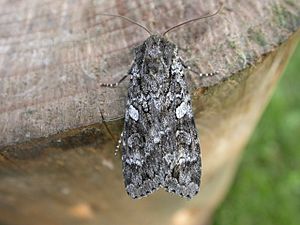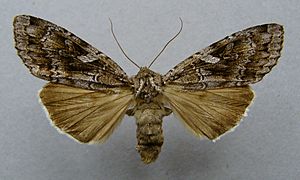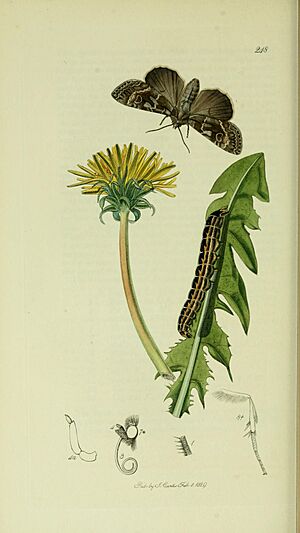Great brocade facts for kids
The great brocade or great gray dart is a type of moth called Eurois occulta. It belongs to the Noctuidae family, which includes many night-flying moths. This moth is found in many parts of the world. It lives across northern and central Europe, and all the way to the Pacific Ocean in Asia. You can also find it in Japan. In North America, it lives across Canada and goes south into states like Virginia. It even lives in cold places like Greenland and Iceland.
Quick facts for kids Great brocade |
|
|---|---|
 |
|
 |
|
| Scientific classification | |
| Kingdom: | |
| Phylum: | |
| Class: | |
| Order: | |
| Family: | |
| Genus: |
Eurois
|
| Species: |
E. occulta
|
| Binomial name | |
| Eurois occulta (Linnaeus, 1758)
|
|
Contents
Appearance of the Great Brocade Moth
The Eurois occulta moth has a wingspan of about 50 to 60 millimeters. That's about 2 to 2.4 inches wide. Its front wings are usually a pale gray color. They can sometimes have darker gray patches.
You might notice a black stripe near the base of its wing. The moth also has large, gray markings on its wings called stigmata. These markings have black outlines. The area between these markings is often dark.
The inner and outer lines on the wings are filled with whitish colors. Near the edge of the wing, there's a line made of black and white shapes that look like teeth. The back wings are dark brownish-gray, but the fringe (the hairs along the edge) is white.
Life Cycle of the Great Brocade Moth
What the Larvae Look Like
The young form of the moth is called a larva, or caterpillar. These larvae are brown and have darker spots. They have yellowish lines along their back. A white line runs along their side where their breathing holes (spiracles) are.
You might also see a series of dark, slanted stripes on their sides. These caterpillars feed on different types of low-growing plants.
What the Larvae Eat
The larvae of the great brocade moth enjoy eating several kinds of plants. They feed on plants like Myrica gale, which is also known as sweet gale. They also eat Vaccinium plants, which include blueberries and cranberries.
Other favorite foods include birch trees and willow trees. They also munch on various other leafy plants found in their habitat.
Historical Connection to Greenland
Scientists have suggested that outbreaks of the great brocade moth might have played a role in history. Some believe these moths could have affected the old Viking settlements in Greenland. This idea comes partly from finding moth pupa remains in ancient peat bogs.
However, the specific peat deposits in a place called Anavik have now dried out. This means that any possible evidence from those sites is no longer available for study.


